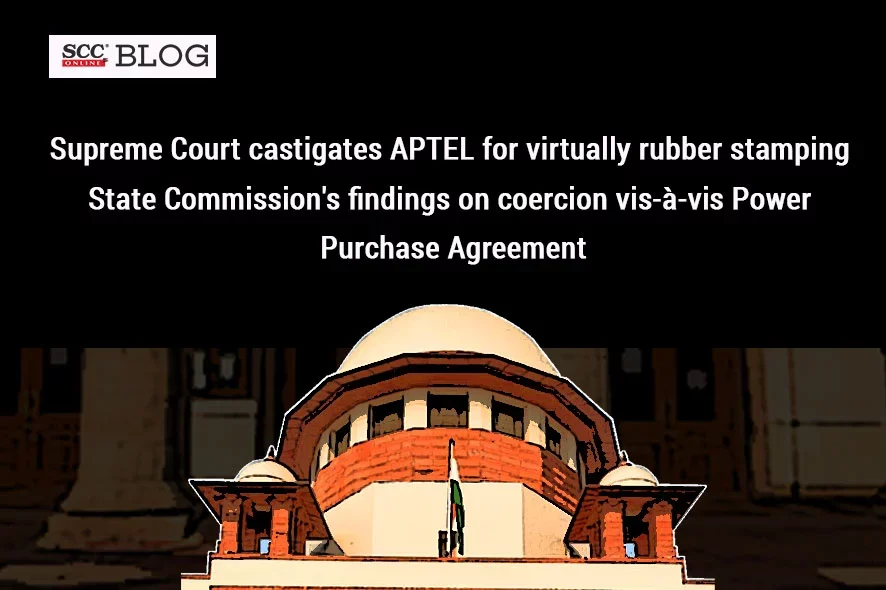Supreme Court: Gujarat Urja Vikas Nigam appealed against two orders of the Appellate Tribunal for Electricity (‘APTEL') wherein appeals as well as the review petition by the present appellant was rejected and the order passed by the Gujarat Electricity Regulatory Commission was affirmed (‘State Commission'). While exercising its civil appellate jurisdiction, the full bench of Sanjaya Kishan Kaul, S. Ravindra Bhat* and M.M. Sundresh J.J., set aside the concurrent findings of coercion of the State Commission and APTEL, with costs payable to appellants.
In the matter at hand, appellant procures power in bulk on behalf of distribution licensees in the State of Gujarat. A Power Purchase Agreement (‘PPA') in terms of the Central Electricity Regulatory Commission (Terms and Conditions for Recognition and issuance of Renewable Energy Certificate for Renewable Energy Generation) Regulations, 2010 (‘REC Regulations 2010') was entered into between the appellant and the Wind Power Developers (‘WPD') including respondent Renew Wind Energy (Rajkot) Pvt. Ltd. (‘RWE').
The Central Commission amended the REC Regulations 2010 and replaced “at a price not exceeding pooled cost of the power purchase” with “at the pooled cost of power purchase” along with the relevant statement of reasons for the said amendment. The respondents being aggrieved by the same, filed a petition before the State Commission arguing that the terms of the PPA had to be changed in view of the change in the REC regulations.
The Petition was allowed by the State Commission directing that the Order of the Central Commission was general and was therefore, applicable to all similarly situated Wind Power Generators. Aggrieved by the Order of the State Commission, the appellant had preferred an appeal before APTEL which was rejected vide order dated 06-12-2018. The appellants preferred review petition against APTEL's Order rejecting their appeal against State Commission's Order which too was dismissed by APTEL vide order dated 24-07-2020.
The Court was of the opinion that the crisis arising out of, and the enormous environmental cost involved in the continued use of fossil fuels had led Governments, world over, to promote alternative and renewable sources of energy. Solar and wind powers were the cheapest source of energy in many countries in the world and was also helping to reduce energy bills. “The rapidly changing economics of such sources has led, the Union government to realize that solar and other renewables can potentially transform the energy landscape, increase access and help India meet its climate change objectives.”
The Bench noticed that in the present case, the obligation to procure renewable energy, was located in the Gujarat Electricity Regulatory Commission (Procurement of Energy from Renewable Sources) Regulations, 2010 (‘renewable sources regulations'). In terms of Regulation 9 (1) of renewable sources regulations, if an Obligated Entity, does not fulfil the renewable purchase obligation as provided in the regulations during any year and also does not purchase the certificates, the State Commission may direct the Obligated Entity to deposit into a separate fund, to be created and maintained by such Obligated Entity, such amount as the State Commission may determine. Thus, they had to take steps to progressively increase the purchase of power from renewable energy sources.
The Bench navigated through the State Commission's regulations relating to procurement of energy from renewable sources which evidently stated that there was never any provision which mandated prior approval by the State Commission of PPA entered into by parties in exercise of their free choice, in relation to renewable energy sources.
The Court was of the view that neither the Commission nor the contesting respondents during the hearings in the present appeals were able to point out any provision in the PPA which conflicted with any provision of the model PPA or any express regulation. Furthermore, it was not established how in the absence of any reference to the Multi Year Tariff Regulations, they were applicable to PPAs relating to renewable energy sources. Thus, held that the findings of APTEL was not based on any stipulated obligations under provision of State regulations, requiring approval of the State Commission, for its operation, cannot be sustained.
The Bench stated that the PPA was voluntarily entered into by the parties which were not affected by its terms. Thus, the findings were contrary to the impugned order and was accordingly set aside. “APTEL, in the most cavalier fashion, virtually rubber stamped the State Commission's findings on coercion, in regard to the entering into the PPA by the parties. There was no shred of evidence, nor any particularity of pleadings, beyond a bare allegation of coercion, alleged against Gujarat Urja.”
The Bench found it incomprehensible as to how such an allegation could have been entertained and incorporated as a finding, given that the respondents were established companies, who enter into negotiations and have the support of experts, including legal advisers, when contracts are finalized. The findings regarding coercion were therefore held to be untenable. “This court is also of the opinion that the casual approach of APTEL, in not reasoning how such findings could be rendered, cannot be countenanced. As a judicial tribunal, dealing with contracts and bargains, which are entered into by parties with equal bargaining power, APTEL is not expected to casually render findings of coercion, or fraud, without proper pleadings or proof, or without probing into evidence.”
With the above stated observations, the concurrent findings of coercion of the State Commission and APTEL was thus, set aside with costs payable to appellants.
[Gujarat Urja Vikas Nigam Limited v. Renew Wind Energy (Rajkot) Private Limited, (2023) SCC OnLine SC 411, decided on 13-04-2023]
Judgment authored by Justice S. Ravindra Bhatt
Advocates who appeared in this case :
For the appellants- Advocate on Record Hemantika Wahi, Advocate Jesal Wahi and Advocate Srishti Khindaria
For the respondents- Advocate on Record Nishtha Kumar, Advocate on Record Vishal Gupta Advocate on Record Nikilesh Ramachandran Advocate on Record Nitin Saluja







